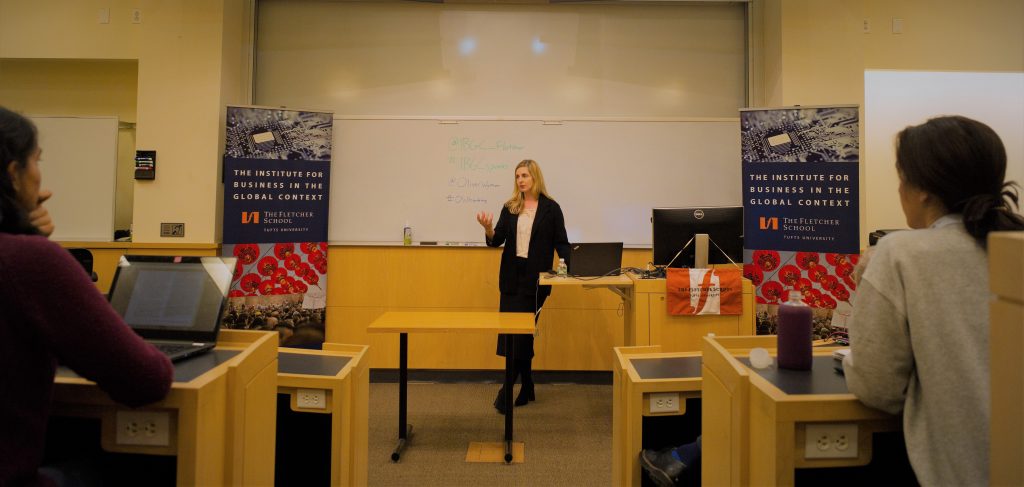Oliver Wyman Partner Mariya Rosberg (F04) Discusses Future of Financial Services Industry
“I sort of came into consulting by accident,” Mariya Rosberg (F04), partner in the Corporate and Institutional Banking practice of Oliver Wyman, told a crowd of students, administrators and faculty from The Fletcher School of Law and Diplomacy earlier this week. And whether it was intentional or just fate, Rosberg’s initial foray into consulting – and her career path since then – has been quite impressive.
The alumna – Rosberg earned a Master of Arts in Law and Diplomacy in 2004 – returned to her alma mater to discuss her career in financial services and offer her thoughts on the future of her industry as part of the Institute for Business in the Global Context’s speaker series.

Before coming to Fletcher, Rosberg explained, she was unsure of exactly which route to take in her career, so she took the opportunity to become a consultant after hearing it could inspire her career search. “Consulting is a great way to learn a craft and learn about an industry from the inside out,” she told students.
After a few years as a consultant, the events of 9/11 occurred, and Rosberg’s path suddenly shifted. “I was moved to change my career and decided to come to Fletcher,” she said.
Since graduating from Fletcher, Rosberg served eight years as a strategy director in the wholesale divisions of two global banks and currently works as a partner for Oliver Wyman. She’s seen the banking industry through both prosperous times and catastrophic ones, and the experience has given Rosberg some valuable insight into the future of the financial services industry.
In the late ‘90s, she explained, banks and financial services companies took many risks and experienced unprecedented growth. On the surface, the industry seemed to be booming, but there were uncalculated underlying issues that would soon be revealed. “There was a real failure in management controls, and that all became obvious when the financial crisis hit,” she said.
Due to messy infrastructures and “nonsensical governance structures,” banks soon experienced a range of issues before turning to a period of recovery after the financial crisis.
Now, banks are moving on from both the crisis and the recovery period, and are trying to envision their relevance and role in the face of a rapidly changing financial services landscape. “Those that acted early, fast, and well are in good shape now and are moving on,” she said. Those that didn’t, on the other hand, are experiencing a growing gap between their position in the industry and that of banks who worked quickly to troubleshoot their failures after the financial crisis.
A discussion of the future of banking would not be complete without a mention of the impact that the 2016 presidential election had on the industry, Rosberg said. Initially, banks were optimistic that President Trump’s Administration would help boost their status and role, but their hopes have not panned out, she said. “Last year turned out to be a pretty bad year for the industry.”
Banks that survived the financial crisis are now facing a new set of dilemmas: In order to thrive amidst a changing financial landscape, banks are investing more in technology, emphasizing the increasing need for security, and are seeking to better understand users’ needs. “User expectations are becoming much more sophisticated than they ever were,” Rosberg said.
In her current role, Rosberg focuses on helping banks “future proof” against disruption in transaction and securities services, and capital markets. Rosberg helps clients predict their future – often through industry trend forecasting – and said many banks are experimenting with new ways to use data.
They’re also confronting a major shift in role requirements. “This shift is really going to change what it looks like/takes to work at a bank,” she explained. As traditional bank roles are increasingly eliminated due to automation, the remaining roles will be very different. In the future, Rosberg says, more bank roles will be built around understanding client segments and roles, assembling partnerships and relationships, and understanding data.
The changing landscape of the banking industry has forced banks to get creative, and many of them will not be able to afford operating at the level they did in the past. In spite of these changes, Rosberg is optimistic about the future of the financial services industry. When asked whether she thinks banks will simply disappear in 10-20 years, Rosberg shared a brighter view. “I don’t think the outcome is that stark, she said. “I do think the trust factor and personalized service factor will mean that traditional models of wholesale banking will continue to exist in many client segments.”
